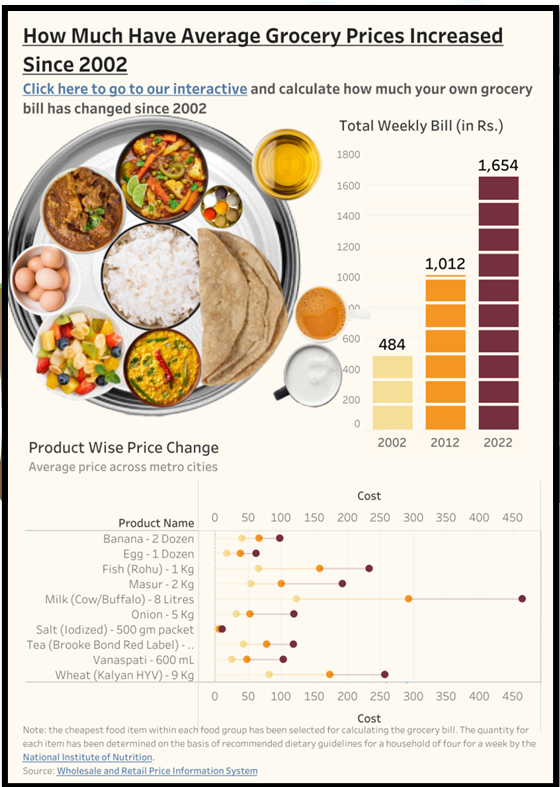“UNRAVELING THE MISSING LINK IN RISING FOOD PRICES”
Syllabus:
- GS-3-Inflation , rising food prices, Indian economy and its impact
Focus :
- Prime Minister Narendra Modi’s assertion of lower inflation since 2014 is accompanied by the complexities of India’s economic trajectory post-2014.
Source- GoI analysis
Introduction:
- Prime Minister Narendra Modi’s assertion of lower inflation since 2014 is accompanied by the complexities of India’s economic trajectory post-2014.
- Despite overall declining inflation, there has been a surge in food prices, indicating a need for deeper examination.
- Recent government measures, like stock reporting mandates, reveal concerns about inflation management.
Understanding the Dynamics of Food Price Inflation:
- Food products have significantly contributed to inflation in the past five years, with direct contributions exceeding 50%.
- The government’s mandate for rice and wheat traders to report stock holdings reflects a shift from earlier commitments.
- However, traders’ influence on inflation is limited due to the perishable nature of goods and annual crop cycles.
Consumer Food Price Inflation (CFPI) :
|
Role of Food Retailers and Government Measures:
- Contrary to assumptions, large food retailers’ influence on inflation is limited, and they often pass on increased costs rather than causing inflation.
- The Indian retail sector, dominated by kirana stores, has limited pricing power compared to global crude oil markets.
- Government measures targeting grain traders are superficial, as food inflation extends beyond cereals and includes pulses and milk.
Addressing the Root Cause:
- The deeper issue of global warming driving climate change affects agricultural output, evident in declining wheat yields in north India.
- Despite government interventions like monitoring private stocks and export bans, the core issue of inadequate supply remains unaddressed.
- Rising food inflation underscores the mismatch between agricultural production and demand, exacerbated by ecological challenges.
Ecological Perspective on Food Inflation:
- Declining water tables, soil moisture evaporation, and depleting topsoil directly impact agricultural yield, exacerbating food price inflation.
- Global warming’s impact on agricultural output highlights the need for ecological interventions to ensure sustainable food production.
Inappropriate Anti-Inflation Policy:
- India’s current inflation-targeting policy overlooks the persistent supply-demand gap in agricultural products.
- The policy’s focus on lowering output growth contradicts the need for increased agricultural productivity to address food inflation.
Conclusion:
- High and persistent food inflation in India underscores the urgency of addressing ecological challenges to ensure sustainable agricultural production.
- Rethinking anti-inflation policies and prioritizing ecological interventions are crucial for mitigating the adverse effects of rising food prices on Indian households.
Source:Indian Express
Mains Practice Question :
GS-3
“Examine the factors contributing to the surge in food prices in India since 2019 and discuss the ecological challenges underlying the phenomenon.”(250Words)
Evaluate the efficacy of current government measures in addressing food inflation and propose alternative strategies to ensure sustainable agricultural production..” (250 words)




